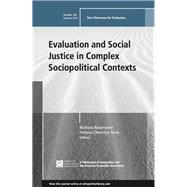- shares a variety of options and examples from different settings,
- gives voice to populations whose voices are rarely heard, and
- contributes to fulfilling the potential of the significant role evaluation can have in promoting social change.
This is the 146th issue in the New Directions for Evaluation series from Jossey-Bass. It is an official publication of the American Evaluation Association.









